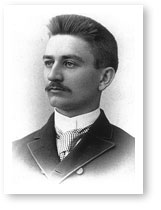Dow, Alex (People)

Dow, Alex
Alex Dow was born on 12 April 1862, in Glasgow, Scotland, the elder of two children and only son of William and Jean (Keppy) Dow. His father, the son of a blacksmith, was an improvident businessman, but Dow's hardworking mother made the most of the family's meager resources. Young Alex left the Presbyterian parish school at the age of eleven and went to work as an office boy in his father's short-lived real estate firm. The following year he became a clerk for the North British Railway in Glasgow, where he also served as a volunteer linesman's helper and developed an early interest in electricity.
In 1880, following his mother's death, he moved to Liverpool and took a job with the Cunard Lines as a stenographer and later as a ticket seller. A brief trip in 1882 to New York City as assistant purser aboard a Cunard ship convinced him that new opportunities awaited him in America, and later that year he migrated to Baltimore. There he worked for the Baltimore & Ohio Railroad, at first as an immigrant agent accompanying steerage passengers to Chicago and then in the railroad's telegraph department. Dow joined the Brush Electric Light Company in Baltimore in 1886 and three years later transferred to the company's Chicago branch as district engineer. His work in designing and supervising the installation of an arc lighting system for Chicago's South Park in preparation for the World's Fair of 1893 earned him a wide reputation.
Dow was called to Detroit in 1893 to design and supervise the construction of a city-owned electric plant, which Mayor Hazen S. Pingree hoped would end the disorder and corruption created by private competition for the municipal street lighting contract. Three years later, after completing the project, Dow became manager of the Edison Illuminating Company, one of several private electric companies then engaged in a bitter struggle for control of the Detroit market. Failing to effect a merger with his less solvent competitors, Dow further weakened them by reducing prices while maintaining quality service. When they fell into bankruptcy, he acquired their plants and brought them into a coordinated system. To ward off new competition, Dow declared his readiness to supply electricity, at a uniform price, to any part of the city, even areas where such service might be unprofitable. In 1903, to secure the capital needed for a new power plant, the firm was reorganized into the Detroit Edison Company. At first as vice-president and general manager, and from 1912 as president, Dow built the company into one of the largest in America; at the time of his retirement in 1940 its invested capital had grown to more than $340,000,000.
Despite his limited training, Dow sought to keep abreast of the latest advances in electrical technology. His early decision, for example, to generate electricity at sixty cycles, rather than the then conventional twenty-five used for direct-current transmission, indicated his faith in the long-range success of alternating current. He also lowered operating costs by installing (I907) in the company's new Delray generating plant a Type W Stirling boiler which increased the plant's firing efficiency. Other development instituted under Dow included the automation of the system's substations, which converted generated current into the proper voltage for redistribution to consumers; the establishment of the "belt line," an integrated system of power transmission lines which reduced the necessity of constructing new power plants; and the installation of equipment permitting the production of high-temperature steam in order to increase the maximum limits of pressure in steam turbines. To keep Edison abreast of technological advances, Dow established in 1925 what was probably the first research department in the electric utility industry.
Dow was active in professional and civic organizations, serving as director of the Edison Electric Institute, as a member of the Detroit Board of Water Commissioners, and, from 1932, as civilian chief of the War Department's Detroit Ordnance District. He won the AIEE Edison Medal in 1936 "For outstanding leadership in the development of the central station industry and its service to the public." Dow died in Ann Arbor, Michigan on 22 March 1942.
| Disclaimer: This article is taken wholly from, or contains information that was originally published by, the Institute of Electrical and Electronics Engineers, Inc.. Topic editors and authors for the Encyclopedia of Earth may have edited its content or added new information. The use of information from the Institute of Electrical and Electronics Engineers, Inc. should not be construed as support for or endorsement by that organization for any new information added by EoE personnel, or for any editing of the original content. |